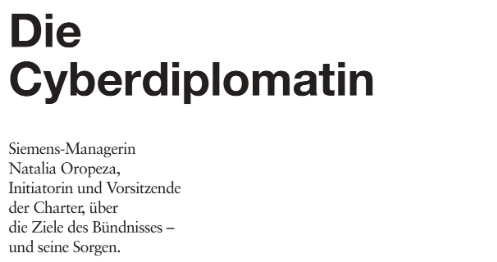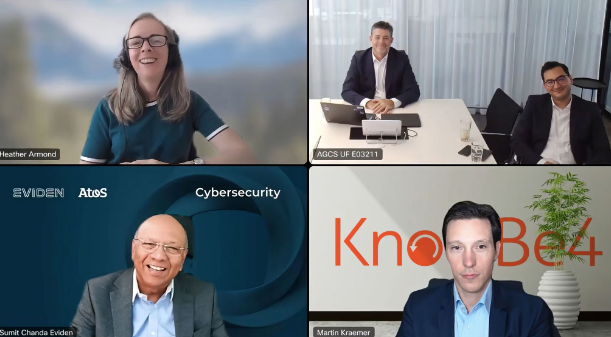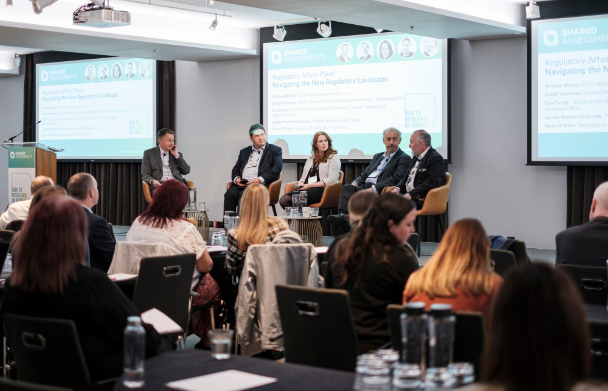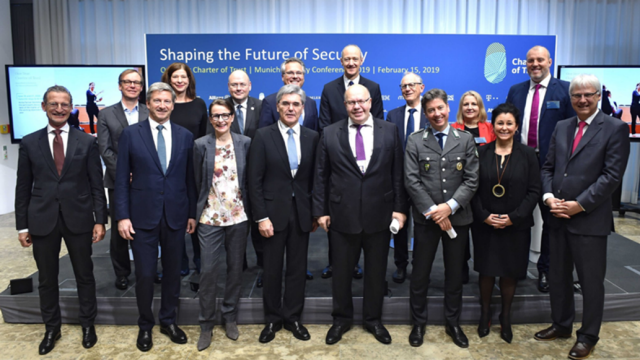At the Munich Security Conference 2019, the 16 global partners of the Charter of Trust look back on a successful first year and set ambitious goals for 2019.
At the Munich Security Conference in February 2018, nine organizations signed the world’s first joint charter for greater cybersecurity. A year on, the Charter of Trust has grown to 16 members. In addition to Siemens and the Munich Security Conference, the signatories include AES, Airbus, Allianz, Atos, Cisco, Daimler, Dell Technologies, Deutsche Telekom, Enel, IBM, NXP, SGS, Total and TÜV Süd. Now, the Charter of Trust welcomes two government authorities to its ranks as associate members for the very first time: the BSI German Federal Office for Information Security, which is one of the most relevant institutions for cybersecurity experts and the CCN National Cryptologic Center of Spain. CCN is an agency of the Spanish State annexed to the National Intelligence Center. In addition, the Graz University of Technology in Austria will be joining the charter as an associate member. The team there focuses on cybersecurity research and for instance was one of the teams that discovered the IT vulnerabilities “Meltdown” and “Spectre”. The associate partner is a new format, through which the Charter opens up for important government representatives, universities and think tanks for cooperation. A benefit to such organizations is that they can cooperate on specific projects without having to become full members with all rights and duties.
“In the age of the internet of things, the cybersecurity is a crucial task. Our Charter of Trust initiative is a very important first step,” said Joe Kaeser, CEO of Siemens. “We’re open to many more partners. Cybersecurity is the key enabler for successful digital businesses as well as protecting critical infrastructure. We hope that this initiative will lead to a lively public awareness and, ultimately, to binding rules and standards.”
An area of early and intense focus has been security of supply chains. Third party risks in supply chains, are becoming a more prevalent issue and are the source of 60 percent of cyberattacks, according to Accenture Strategy. Charter of Trust member companies have worked out baseline requirements and propose their implementation for making cybersecurity an absolute necessity throughout all digital supply chains. These requirements address all aspects of cybersecurity – including people, process and technology. Examples of these requirements include:
- Data shall be protected from unauthorized access throughout the data lifecycle.
- Appropriate level of identity and access control and monitoring, including third parties, shall be in place and enforced.
- A process shall be in place to ensure that products and services are authentic and identifiable.
- A minimum level of security education and training for employees shall be regularly deployed.
Charter of Trust members are establishing a risk-based methodology for implementing these requirements in their own supply chains, involving supply chain partners in the process.
In 2018 Charter of Trust round tables worldwide enabled an in-depth exchange between policy makers and the Charter partners. Governments and industry are aligning at the global, regional and national levels in the pursuit of common security goals. The “Paris Peace Call for Trust & Security in Cyberspace” presented in November 2018 by French President Emmanuel Macron is a clear commitment to form and achieve stability in cyberspace and confirms the willingness to work together to define and implement international cybersecurity principles. Content wise, the Paris Peace Call shares key tenets with the Charter of Trust principles and the partners look forward to seeing them reinforced further at the forthcoming G7 summit. Also, the new EU Cybersecurity Act was an important step towards strengthening cyber institutions and providing a framework to develop cyber certifications. The Charter of Trust members look forward to bringing their expertise to bear in the development of the certifications as implementation gets underway in 2019.
The Charter of Trust has set ambitious goals for 2019. Besides deepening and expanding the policy dialog, members plan to advance two topics: “Cybersecurity by Default” and “Education” – meaning predictive cybersecurity settings embedded in products and other environments, and global continuing training efforts both inside and outside companies. According to the Center for Strategic and International Studies, threats to cybersecurity in 2018 caused 500 billion euros in losses worldwide. And threats to cybersecurity are constantly on the rise as the world digitalizes further: according to Gartner, 8.4 billion networked devices were in use in 2017 – 31 percent more than in 2016. The figure is expected to rise to 20.4 billion by 2020.


You may also like

Chairwoman Natalia Oropeza in Brandeins Magazine
In an interview with Dorit Kowitz, Natalia dives deep into the pressing issues facing the cybersecurity landscape, explaining how the Charter of Trust bundles the expertise of different businesses across several regions to stay resilient in the face of evolving threats. As Natalia Oropeza says: "We all win if cybercrime doesn’t win."
Here are three key insights from her interview:
🔑 Collaboration is essential: No single organization can tackle cyber threats alone. The Charter of Trust is a prime example that businesses nowadays are more transparent when it comes to attacks and that sharing information in this field can be beneficial.
🔑 Addressing the digital skills gap: The Charter of Trust is working to address the global shortage of cybersecurity professionals by encouraging diversity and actively promoting opportunities for women to join the field.
🔑 Unified regulations: Harmonizing global cybersecurity standards will reduce vulnerabilities, helping businesses and governments combat threats more effectively.
The full interview is available here: https://lnkd.in/gRm6ZDGC


Cybersecurity Awareness Month
The complexity and urgency of this topic gathered a lot of interest, with 600+ attendees throughout the whole panel, which was composed of Jon-Paul Jones, COO at AZ Commercial, Firas Ben Hassan, GenAI expert & Manager of AllianzGPT at AZ Technology, Dr. Martin J. Krämer, External Security Awareness Advocate at KnowBe4, and Dr Sumit Chanda, Global CISO at Eviden & Chair of the Global External Engagement Working Group at the Charter of Trust.
We are pleased to see Dr. Sumit Chanda from Eviden bringing in his unique CISO insight on what these emerging technologies mean in day-to-day cybersecurity practices and bringing in the Charter of Trust perspective on this topic as well.
Thank you, Ervin Cihan and Haydn Griffiths for inviting other CoT Partners and for the great initiatives that Allianz is putting together within this year’s Security Awareness Month. And special thanks to Heather Armond for the great moderation.


UK/EU Summit - “Risk to Resilience”
💡Under the theme “Risk to Resilience” the first event of this series was held in London and brought together professionals from different industries and regions. Detlef participated in the panel about the complex regulatory landscape and emphasized that new legislation like the EU AI Act, DORA and Hashtag#NIS2 continue to push the standard of care on cybersecurity and other risks.
Thanks to Shared Assessments for organizing such an amazing event and inviting the Charter of Trust to participate in this high-class panel alongside Andrew Moyad, CEO at Shared Assessments.




